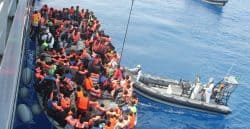The United States has suspended imports of tobacco and tobacco products from Malawi over concerns that they were produced using forced child labor.
US Customs and Border Protection, which has the authority and duty under the law to seize imports it suspects of being produced using forced labor, issued the “Withhold Release Order” on Malawi tobacco as its latest target in the fight against forced labor in supply chains.
“Malawi tobacco is one of those areas where we are trying to send a message,” said CBP Office Of Trade Executive Assistant Commissioner Brenda Smith.
Forced labor in Malawi’s tobacco industry is well-documented; the US Department of Labor notes that children harvesting the crop are exposed to toxic pesticides and chemicals.
Children working in the tobacco harvest also risk illness from nicotine absorption, including “green tobacco sickness,” according to the Department of Labor.
CNN reports:
The detainment order against Malawi tobacco is the seventh this year, the most the US has issued since the early 1990s when a number were issued against Chinese companies.
The US has had a prohibition on the import of goods produced using forced labor since the early 1930s, but enforcement was extremely sparse.
A 2016 change in the law ending exceptions, along with increased awareness and a push by then-CBP Commissioner Gil Kerlikowske spurred the agency to use its authorities more aggressively, an agency officials said.
In 2018, CBP received funding for 140 new positions, some of which went to establish the Forced Labor Division and training. “We have been able to build out a program,” using CBP’s law enforcement capabilities,” said the official.
“It’s still a work in progress.”
When blocking imports, it’s important that US Customs strikes a balance between holding companies accountable and potentially hurting local economies.
“One of the things we learned early on is, naming and shaming is a tool you want to use very carefully,” explained on Customs official. There are certainly consequences for businesses named as complicit in forced labor, as well as economic and political reactions to US government decisions.
To issue a Withhold and Release Order, US Customs only needs information that reasonably, but not conclusively, indicates that merchandise being imported had used forced labor.







Freedom United is interested in hearing from our community and welcomes relevant, informed comments, advice, and insights that advance the conversation around our campaigns and advocacy. We value inclusivity and respect within our community. To be approved, your comments should be civil.